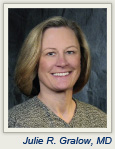 Julie R. Gralow, MD, Professor of Oncology at the University of Washington, Seattle, said the data reported by Rickles et al at the American Society of Breast Surgeons Annual Meeting support the Goodwin study presented at the 2008 ASCO Annual Meeeting.1 In that earlier Canadian cohort of 512 women, subjects with vitamin D deficiency had a 94% increased risk for distant recurrence and a 73% risk for death. The prognostic significance of vitamin D levels was independent of patient age or weight, tumor stage, or tumor grade.
Julie R. Gralow, MD, Professor of Oncology at the University of Washington, Seattle, said the data reported by Rickles et al at the American Society of Breast Surgeons Annual Meeting support the Goodwin study presented at the 2008 ASCO Annual Meeeting.1 In that earlier Canadian cohort of 512 women, subjects with vitamin D deficiency had a 94% increased risk for distant recurrence and a 73% risk for death. The prognostic significance of vitamin D levels was independent of patient age or weight, tumor stage, or tumor grade.
“The additional Oncotype information on these patients is new and important,” she noted.
“What will really be critical is to show that changing the vitamin D level through supplementation and monitoring blood levels can impact either the development of breast cancer (or at least aggressive breast cancer), or the outcome of the cancer with aggressive features at diagnosis,” Dr. Gralow said.
The Southwest Oncology Group is initiating a 1-year pilot study of vitamin D repletion/supplementation in premenopausal women at risk for developing breast cancer. The endpoints will be changes in mammographic density and proliferation markers (Ki‑67) in biopsies of breast epithelium, she said. ■
Financial Disclosure: Dr. Gralow reported no potential conflicts of interest.
Reference
1. Goodwin PJ, Ennis M, Pritchard KI, et al: Frequency of vitamin D (Vit D) deficiency at breast cancer (BC) diagnosis and association with risk of distant recurrence and death in a prospective cohort study of T1-3, NO-1, MO BC (abstract 511). J Clin Oncol 26(15S):9s, 2008.

